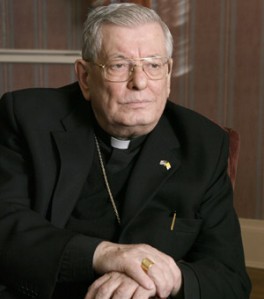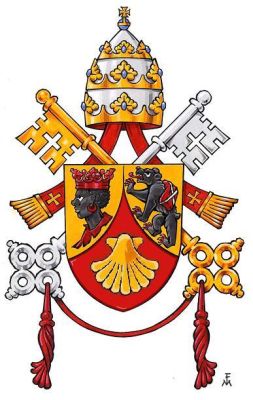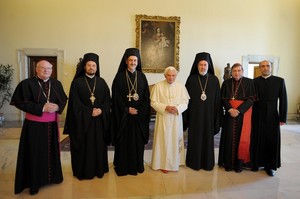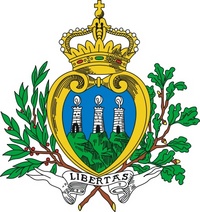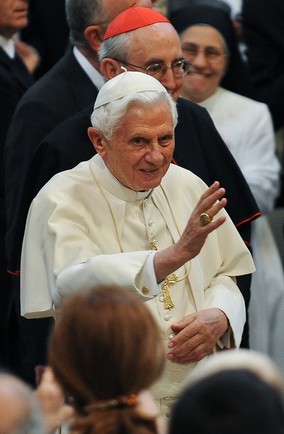Tag: Pope Benedict XVI
Somalia is the most severe humanitarian emergency in the world
 In his Sunday prayers Pope Benedict appealed on behalf of the victims of the severe drought in the Horn of Africa, particularly Somalia. He asked Christians to show solidarity for the millions that face death by starvation in the worst conditions there in a century. Rain is not expected until October.
In his Sunday prayers Pope Benedict appealed on behalf of the victims of the severe drought in the Horn of Africa, particularly Somalia. He asked Christians to show solidarity for the millions that face death by starvation in the worst conditions there in a century. Rain is not expected until October.Saints Peter and Paul: “I no longer call you servants, but friends”
The Church celebrates today great solemn feast of Saints Peter and Paul, it is also the 60th anniversary of Pope Benedict’s priestly ordination as well as the day the See of Constantinople sends a delegation to Rome to pray at the tombs of the two great saints and to meet with the Pope. Plus, it is the day in which the metropolitan archbishops who have been appointed in the last calendar year come to Rome to receive the palium (see below). The USA has for archbishops receiving their pallium today: San Antonio, Oklahoma City, Seattle and Los Angelos. All four of these archbishops are under 60. Watch the video clip.
“Non iam dicam servos, sed amicos” – “I no longer call you servants, but friends” (cf. Jn 15:15).
Sixty years on from the day of my priestly ordination, I hear once again deep within me these words of Jesus that were addressed to us new priests at the end of the ordination ceremony by the Archbishop, Cardinal Faulhaber, in his slightly frail yet firm voice. According to the liturgical practice of that time, these words conferred on the newly-ordained priests the authority to forgive sins. “No longer servants, but friends”: at that moment I knew deep down that these words were no mere formality, nor were they simply a quotation from Scripture. I knew that, at that moment, the Lord himself was speaking to me in a very personal way. In baptism and confirmation he had already drawn us close to him, he had already received us into God’s family. But what was taking place now was something greater still. He calls me his friend. He welcomes me into the circle of those he had spoken to in the Upper Room, into the circle of those whom he knows in a very special way, and who thereby come to know him in a very special way. He grants me the almost frightening faculty to do what only he, the Son of God, can legitimately say and do: I forgive you your sins. He wants me – with his authority – to be able to speak, in his name (“I” forgive), words that are not merely words, but an action, changing something at the deepest level of being. I know that behind these words lies his suffering for us and on account of us. I know that forgiveness comes at a price: in his Passion he went deep down into the sordid darkness of our sins. He went down into the night of our guilt, for only thus can it be transformed. And by giving me authority to forgive sins, he lets me look down into the abyss of man, into the immensity of his suffering for us men, and this enables me to sense the immensity of his love. He confides in me: “No longer servants, but friends”. He entrusts to me the words of consecration in the Eucharist. He trusts me to proclaim his word, to explain it aright and to bring it to the people of today. He entrusts himself to me. “You are no longer servants, but friends”: these words bring great inner joy, but at the same time, they are so awe-inspiring that one can feel daunted as the decades go by amid so many experiences of one’s own frailty and his inexhaustible goodness.
“No longer servants, but friends”: this saying contains within itself the entire programme of a priestly life. What is friendship? Idem velle, idem nolle – wanting the same things, rejecting the same things: this was how it was expressed in antiquity. Friendship is a communion of thinking and willing. The Lord says the same thing to us most insistently: “I know my own and my own know me” (Jn 10:14). The Shepherd calls his own by name (cf. Jn 10:3). He knows me by name. I am not just some nameless being in the infinity of the universe. He knows me personally. Do I know him? The friendship that he bestows upon me can only mean that I too try to know him better; that in the Scriptures, in the Sacraments, in prayer, in the communion of saints, in the people who come to me, sent by him, I try to come to know the Lord himself more and more. Friendship is not just about knowing someone, it is above all a communion of the will. It means that my will grows into ever greater conformity with his will. For his will is not something external and foreign to me, something to which I more or less willingly submit or else refuse to submit. No, in friendship, my will grows together with his will, and his will becomes mine: this is how I become truly myself. Over and above communion of thinking and willing, the Lord mentions a third, new element: he gives his life for us (cf. Jn 15:13; 10:15). Lord, help me to come to know you more and more. Help me to be ever more at one with your will. Help me to live my life not for myself, but in union with you to live it for others. Help me to become ever more your friend.
Jesus’ words on friendship should be seen in the context of the discourse on the vine. The Lord associates the image of the vine with a commission to the disciples: “I appointed you that you should go out and bear fruit, and that your fruit should abide” (Jn 15:16). The first commission to the disciples, to his friends, is that of setting out – appointed to go out -, stepping outside oneself and towards others. Here we hear an echo of the words of the risen Lord to his disciples at the end of Matthew’s Gospel: “Go therefore and make disciples of all nations …” (cf. Mt 28:19f.) The Lord challenges us to move beyond the boundaries of our own world and to bring the Gospel to the world of others, so that it pervades everything and hence the world is opened up for God’s kingdom. We are reminded that even God stepped outside himself, he set his glory aside in order to seek us, in order to bring us his light and his love. We want to follow the God who sets out in this way, we want to move beyond the inertia of self-centredness, so that he himself can enter our world.
After the reference to setting out, Jesus continues: bear fruit, fruit that abides. What fruit does he expect from us? What is this fruit that abides? Now, the fruit of the vine is the grape, and it is from the grape that wine is made. Let us reflect for a moment on this image. For good grapes to ripen, sun is needed, but so too is rain, by day and by night. For noble wine to mature, the grapes need to be pressed, patience is needed while the juice ferments, watchful care is needed to assist the processes of maturation. Noble wine is marked not only by sweetness, but by rich and subtle flavours, the manifold aroma that develops during the processes of maturation and fermentation. Is this not already an image of human life, and especially of our lives as priests? We need both sun and rain, festivity and adversity, times of purification and testing, as well as times of joyful journeying with the Gospel. In hindsight we can thank God for both: for the challenges and the joys, for the dark times and the glad times. In both, we can recognize the constant presence of his love, which unfailingly supports and sustains us.
Yet now we must ask: what sort of fruit does the Lord expect from us? Wine is an image of love: this is the true fruit that abides, the fruit that God wants from us. But let us not forget that in the Old Testament the wine expected from noble grapes is above all an image of justice, which arises from a life lived in accordance with God’s law. And this is not to be dismissed as an Old Testament view that has been surpassed – no, it still remains true. The true content of the Law, its summa, is love for God and for one’s neighbour. But this twofold love is not simply saccharine. It bears within itself the precious cargo of patience, humility, and growth in the conforming of our will to God’s will, to the will of Jesus Christ, our friend. Only in this way, as the whole of our being takes on the qualities of truth and righteousness, is love also true, only thus is it ripe fruit. Its inner demand – faithfulness to Christ and to his Church —seeks a fulfilment that always includes suffering. This is the way that true joy grows. At a deep level, the essence of love, the essence of genuine fruit, coincides with the idea of setting out, going towards: it means self-abandonment, self-giving, it bears within itself the sign of the cross. Gregory the Great once said in this regard: if you are striving for God, take care not to go to him by yourselves alone — a saying that we priests need to keep before us every day (H Ev 1:6:6 PL 76, 1097f.).
Dear friends, perhaps I have dwelt for too long on my inner recollections of sixty years of priestly ministry. Now it is time to turn our attention to the particular task that is to be performed today.
On the feast of Saints Peter and Paul my most cordial greeting goes first of all to the Ecumenical Patriarch Bartholomaios I and to the Delegation he has sent, to whom I express sincere thanks for their most welcome visit on the happy occasion of this feast of the holy Apostles who are Rome’s patrons. I also greet the Cardinals, my brother bishops, the ambassadors and civil authorities as well as the priests, the confrères of my first Mass, religious and lay faithful. I thank all of you for your presence and your prayers.
The metropolitan archbishops appointed since the feast of Saints Peter and Paul last year are now going to receive the pallium. What does this mean? It may remind us in the first instance of Christ’s easy yoke that is laid upon us (cf. Mt 11:29f.). Christ’s yoke is identical with his friendship. It is a yoke of friendship and therefore “a sweet yoke”, but as such it is also a demanding yoke, one that forms us. It is the yoke of his will, which is a will of truth and love. For us, then, it is first and foremost the yoke of leading others to friendship with Christ and being available to others, caring for them as shepherds. This brings us to a further meaning of the pallium: it is woven from the wool of lambs blessed on the feast of Saint Agnes. Thus it reminds us of the Shepherd who himself became a lamb, out of love for us. It reminds us of Christ, who set out through the mountains and the deserts, in which his lamb, humanity, had strayed. It reminds us of him who took the lamb – humanity – me – upon his shoulders, in order to carry me home. It thus reminds us that we too, as shepherds in his service, are to carry others with us, taking them as it were upon our shoulders and bringing them to Christ. It reminds us that we are called to be shepherds of his flock, which always remains his and does not become ours. Finally the pallium also means quite concretely the communion of the shepherds of the Church with Peter and with his successors – it means that we must be shepherds for unity and in unity, and that it is only in the unity represented by Peter that we truly lead people to Christ.
Sixty years of priestly ministry – dear friends, perhaps I have spoken for too long about this. But I felt prompted at this moment to look back upon the things that have left their mark on the last six decades. I felt prompted to address to you, to all priests and bishops and to the faithful of the Church, a word of hope and encouragement; a word that has matured in long experience of how good the Lord is. Above all, though, it is a time of thanksgiving: thanks to the Lord for the friendship that he has bestowed upon me and that he wishes to bestow upon us all. Thanks to the people who have formed and accompanied me. And all this includes the prayer that the Lord will one day welcome us in his goodness and invite us to contemplate his joy. Amen.
Benedict XVI launches News.va with his new iPad
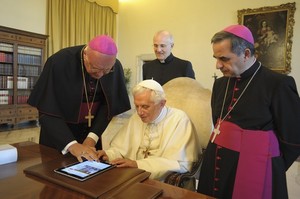 Today, Pope Benedict launched a new Vatican website with a new iPad.
Today, Pope Benedict launched a new Vatican website with a new iPad.
The Church can’t live without the Eucharist, Pope Benedict reminds
 Today in Italy and other countries Corpus Domini is
Today in Italy and other countries Corpus Domini is
celebrated, the feast of the Eucharist, the Sacrament of the Body and Blood of
the Lord, which he instituted with the Last Supper and which is the Church’s
most precious treasure. The Eucharist is like the beating heart that gives life
to the whole mystical body of the Church: a social organism entirely founded on
the spiritual but concrete link with Christ. As the Apostle Paul states: “Because
there is one bread, we, although many, are one body: all of us in fact
participate in the one bread” (1 Corinthians 10:17).
Church simply would not exist. It is the Eucharist in fact that makes a human
community a mystery of communion, able to bring God to the world and the world
to God. The Holy Spirit, which transforms the bread and wine into the Body and
Blood of Christ, also transforms into members of the Body of Christ those who
receive it with faith, so that the Church is truly the sacrament of the unity
of men with God and of men with each other.
individualistic — like that in which Western societies are immersed and which
is spreading throughout the world — the Eucharist constitutes a kind of “antidote,”
which operates in the minds and hearts of believers and continually sows in them
the logic of communion, of service, of sharing, in a word, the logic of the
Gospel. The first Christians, in Jerusalem, were an evident sign of this new
way of life because they lived in fraternity and held all of their goods in
common so that no one should be indigent (cf. Acts 2:42-47). Where did all of
this come from? From the Eucharist, that is, the risen Christ, really present
with his disciples and working with the power of the Holy Spirit. And in the
succeeding generations, through the centuries, the Church, despite human limits
and errors, continued to be a force for communion in the world. We think
especially of the most difficult periods, the periods of trial: What did it
mean, for example, for countries that were under the heal of totalitarian regimes
to have the possibility to gather for Sunday Mass! As the ancient martyrs of
Abitene proclaimed: “Sine Dominico non possumus” – without the “Dominicum,” that is, the Sunday Eucharist, we cannot live. But the
void produced by false freedom can be dangerous, and so communion with the Body
of Christ is a medicine of the intellect and will to rediscover taste for the
truth and the common good.
my predecessor, Blessed John Paul II defined as a “Eucharistic woman”
(Ecclesia de Eucharistia, 53-58). In her school our life too becomes fully “Eucharistic,”
open to God and to others, able to transform evil into good by the power of
love, which fosters unity, communion, fraternity.
Benedict asks us to preserve and appreciate our Christian values, identity
Yesterday Pope Benedict visited San Marino. You remember, San Marino is the oldest republic founded by Saint Marin, a deacon, and Saint Leo who escaped the clutches of the Emperor Diocletian by coming from Dalmatia to Rimini. San Marino is in central Italy with about 24 square miles with a population of about 31K. San Marino was first founded as a monastic community in the early period of the 4th century and today it is governed by a constitution adopted in 1600 and is still in effect. Two interesting facts: Saint Agatha is the patron saint and Abraham Lincoln was an honorary citizen.
Follow the Pope in a historical way (even spiritually) who’ll notice his insistence on Europeans –indeed all nations with Christian roots– preserving and appreciating Christian tradition as the moral ground of society. There’s a tendency today to push aside one’s Christian patrimony in favor of a secularist mentality that rejects Christ and His Gospel. It seems that we are now embarrassed by our belief in Christ; we longer say with confidence that Christ died for me and that He’s now risen from the dead and that the Holy Spirit lives in us; that we are scared by what others are going to say and I dare say we’d rather be superficial and believe in nothing than accept the offer of Love from God. Why is it that Christ, who is the source of our being and our destiny is easily dismissed?
In San Marino, Pope Benedict exhorts us all to hold fast to what has been given to us: freedom, love, and meaning.
My heartfelt
gratitude for your hospitality, in particular I express my gratitude to the
captains regent, also for the courteous words they addressed to me. I greet the
members of the government and of the Congress, as well as the diplomatic corps
and all the other authorities gathered here. In addressing you, I embrace
ideally the whole people of San Marino. From its birth, this republic has had
friendly relations with the Apostolic See, and in recent times they have been
intensified and consolidated; my presence here, in the heart of this ancient
republic, expresses and confirms this friendship
Continue reading Benedict asks us to preserve and appreciate our Christian values, identity
Together in Christ

Image via Wikipedia
The Pope’s “Together in Christ” two day visit of Croatia was significant for several reasons. For him, and I think for all of us who were either physically in Zagreb or tuned via the media, time spent with the Croatians was monumental because it clearly exhibited the “dynamism of communion.” (What visit of a pope is insignificant, the wag asks?) In his own words, the Benedict reviews the events he and the world lived with him in this way:
- “the experience of finding ourselves together united in the name of Christ,
- the experience of being Church, which is manifested … around the Successor of Peter.
- ‘Together in Christ’ referred in a particular way to the family (… the occasion of my visit was the First National Day of Croatian Catholic Families…
It was very important for me to confirm in the faith especially these families that the Second Vatican Council called “domestic churches” (cf. Lumen Gentium, 11).
In today’s Europe [and one can extend this to the globe], nations with a strong Christian tradition have a special responsibility to defend and promote the value of the family founded on marriage, which remains decisive both within the field of education as well as in the social sphere.”
Ratzinger Prize given to 3
WOW! Imagine giving a prize in your own name! Well, if you are the Pope and an eminent theologian, you can (and will). This is cool, as “they” say. Vatican Radio announced today that the Pope has given the prize in theological studies in this thought. While 2 of the 3 are senior in age and wisdom, but don’t be fooled: all of them are top scholars and widely known; the youngest recipient has a lot more juice in him. Abbot Maximillian is the author of a brilliant book on Ratzinger’s theology, Joseph Ratzinger: Life in the Church and Living Theology (Ignatius Press 2007).
announced on Tuesday in the Vatican Press Office. The prize was established
last year to promote theological studies on the writings of the Pope, and to
reward promising scholars. The prizes will be given out by Pope Benedict on
June 30th.
Ratzinger-Benedict XVI Vatican Foundation, which was funded by Pope Benedict
with the royalties he has received from his books.
conferences the foundation sponsors focus on helping the truth, meaning and
beauty of Christianity in relation to today’s culture and society emerge.
Tuesday, the first three winners of the Ratzinger Prize were announced.
The Primacy of the Human, develop a human ecology, Pope reminds
The primacy of the human is based on our belief in the transcendent. All aspects of the human person –politics, philosophy, ethics, economics and medicine– are rooted in the respect of and in engagement with the Divine. Catholics will further develop this idea of the transcendent by reflecting on the Trinity of the Godhead, God the Father, God the Son, and God the Holy Spirit. A personal God who lives and is active in history. The pope addressed the new ambassadors of Moldova, Equatorial Guinea, Belize, Syria, Ghana and New Zealand on 9 June when they presented their diplomatic credentials to the Holy See. Ordinarily, one doesn’t pay lots of attention to papal discourses made to the diplomats but it seems that there is some serious thinking going on here with the Pope viz. this sector of his ministry.
Continue reading The Primacy of the Human, develop a human ecology, Pope reminds
Benedict XVI’s Pentecost 2011 homily: it is the Truth who loves me
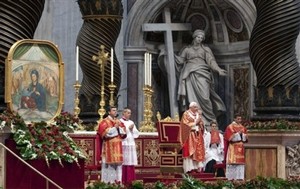 Today we celebrate the great solemnity of Pentecost. If, in a certain sense, all of the Church’s liturgical celebrations are great, this one of Pentecost is so in a singular manner, because, arriving at the 50th day, it marks the fulfillment of the Easter event, of the death and resurrection of the Lord Jesus, through the gift of the Risen Lord’s Spirit. The Church has prepared us in recent days for Pentecost with her prayers, with the repeated and intense plea to God for a renewed outpouring of the Holy Spirit upon us. The Church re-lived in this way the events of her origins, when the Apostles, gathered in the cenacle in Jerusalem “were perseverant and united in prayer together with some women and Mary, the mother of Jesus, and his brothers” (Acts 1:14). They were gathered in humble and confident expectation that the Father’s promise communicated to them by Jesus would be fulfilled: “Before long you will be baptized in the Holy Spirit … you will receive the power of the Holy Spirit, who will descend upon you” (Acts 1:5, 8).
Today we celebrate the great solemnity of Pentecost. If, in a certain sense, all of the Church’s liturgical celebrations are great, this one of Pentecost is so in a singular manner, because, arriving at the 50th day, it marks the fulfillment of the Easter event, of the death and resurrection of the Lord Jesus, through the gift of the Risen Lord’s Spirit. The Church has prepared us in recent days for Pentecost with her prayers, with the repeated and intense plea to God for a renewed outpouring of the Holy Spirit upon us. The Church re-lived in this way the events of her origins, when the Apostles, gathered in the cenacle in Jerusalem “were perseverant and united in prayer together with some women and Mary, the mother of Jesus, and his brothers” (Acts 1:14). They were gathered in humble and confident expectation that the Father’s promise communicated to them by Jesus would be fulfilled: “Before long you will be baptized in the Holy Spirit … you will receive the power of the Holy Spirit, who will descend upon you” (Acts 1:5, 8).
In the Pentecost liturgy, corresponding to the narrative of the Acts of the Apostles of the birth of the Church (cf. Acts 2:1-11), is Psalm 103, which we heard: a praise that goes up from all creation, exalting the Creator Spirit, who did everything with wisdom: “How many are your deeds, O Lord! You have done them with wisdom; the earth is filled with your creatures … may it always be the glory of the Lord; may the Lord rejoice in his works” (Psalm 103:24, 31). What the Church wishes to tell us is this: The creator Spirit of all things, and the Holy Spirit whom Christ had sent from the Father to the community of disciples, are one and the same: creation and redemption belong reciprocally to each other and they constitute, in their depths, a single mystery of love and salvation. The Holy Spirit is first of all the Creator Spirit and so Pentecost is the feast of creation. For us Christians the world is the fruit of an act of the love of God, who made all things and who rejoices in them because they are “good,” “very good,” as the account of creation states (cf. Genesis 1:1-31).
Thus God is not totally Other, unnamable and obscure. God reveals himself, he has a face, God is reason, God is will, God is love, God is beauty. The faith in the Creator Spirit is the faith in the Spirit whom the risen Christ bestowed upon the Apostles and bestows on each one of us; they are therefore inseparably joined.
Today’s second reading and Gospel show us this connection. The Holy Spirit is he who helps us recognize the Lord, and he makes us pronounce the Church’s profession of faith: “Jesus is Lord” (cf. 1 Corinthians 12:3b). “Lord” is the title given to God in the Old Testament, a title that in the reading of the Bible took the place of his unspeakable name. The Church’s Creed is nothing more than the development of what is said with this simple affirmation: “Jesus is Lord.” St. Paul tells us of this profession of faith that it is from the word and work of the Holy Spirit. If we want to be in the Spirit, we must adhere to this Creed. Making it our own, accepting it as our word, we acquiesce to the work of the Holy Spirit.
The expression “Jesus is Lord” can be read in two senses. It means: Jesus is God, and at the same time: God is Jesus. The Holy Spirit illuminates this reciprocity: Jesus has divine dignity, and God has the human face of Jesus. God shows himself in Jesus and with this conveys to us the truth about ourselves. The event of Pentecost is letting ourselves be deeply enlightened by this word. Reciting the Creed we enter into the mystery of the first Pentecost: There occurs a radical transformation in the chaos of Babel, in those voices that vie against each other: the multiplicity becomes a multiform unity; from the unifying power of Truth comes growth in understanding. In the Creed that brings us together from the four corners of the earth, which, through the Holy Spirit, does this in a way that permits understanding even in the midst of the diversity of languages, through faith, hope and love, is formed the new community of the Church of God.
The Gospel passage offers us a marvelous image to clarify the connection between Jesus, the Holy Spirit and the Father: the Holy Spirit is represented as the breath of the risen Jesus Christ (cf. John 20:22). The Evangelist John borrows an image here from the account of creation, where it says that God breathed into man’s nostrils a breath of life (cf. Genesis 2:7). The breath of God is life. Now the Lord breathes into our soul the new breath of life, the Holy Spirit, his most intimate essence, and in this way we are welcomed into the family of God. With baptism and confirmation we are given this gift in a specific way, and with the sacraments of the Eucharist and penance it is continually repeated: the Lord breathes a breath of life into our soul. All of the sacraments, each in its proper way, communicate the divine life to man thanks to the Holy Spirit who works in them.
In today’s liturgy we see another connection. The Holy Spirit is both Creator and the Spirit of Jesus Christ, in a way however that the Father, Son and Holy Spirit are one single God. And in light of the first reading we can add: The Holy Spirit animates the Church. She does not derive from the human will, from reflection, from man’s ability and from his capacity to organize, because if this were the case, she would have already been extinct for some time, just as every human thing passes. She is rather the Body of Christ animated by the Holy Spirit. The images of wind and fire, used by St. Luke to represent the coming of the Holy Spirit (cf. Acts 2:2-3), recall Sinai, where God was revealed to the people of Israel and he granted them his covenant; “Mount Sinai was covered in smoke,” we read in the Book of Exodus, “because the Lord had descended upon it in fire” (19:18). In fact Israel celebrated the 50th day after Passover, after the commemoration of the flight out of Egypt, as the feast of Sinai, the feast of the Covenant. When St. Luke speaks of tongues of fire to represent the Holy Spirit, the ancient covenant, established on the basis of the Law received by Israel on Sinai, is recalled. Thus, the event of Pentecost is represented as a new Sinai, as the gift of a new covenant in which the alliance with Israel is extended to all the peoples of the earth, in which all of the barriers of the old Law crumble and its holiest and immutable core appears, which is love, that precisely the Holy Spirit communicates and spreads, the love that embraces all things. At the same time the Law expands, it opens while remaining more basic: It is the New Covenant that the Holy Spirit “writes” in the hearts of those who believe in Christ. The extension of the Covenant to all the nations of the earth is represented by St. Luke through the considerable list of peoples of that time (cf. Acts 2:9-11).
With this we are told something very important: that the Church is catholic from the very first moment, that her university is not the fruit of the subsequent inclusion of diverse communities. From the first instant, in fact, the Holy Spirit created her as the Church of all peoples; she embraces the whole world, she transcends all frontiers of race, class, nation; she razes all the bastions and unites men in the profession of God one and triune. From the very beginning the Church is one, catholic and apostolic: This is her true nature and as such she must be recognized. She is holy, not due to the capacity of her members, but because God himself, with his Spirit, always creates her, purifies her and sanctifies her.
Finally, today’s Gospel gives us this beautiful expression: “The disciples rejoiced in seeing the Lord” (John 20:20). These words are profoundly human. The lost Friend is present again, and those who were frightened before now rejoice. But it says more than this. Because the lost Friend does not come from just anywhere but from the night of death — and he passed through it! — he is not just anyone but both the Friend and he who is the Truth that gives men life; and what he gives is not just any joy, but joy itself, the gift of the Holy Spirit. Yes, it is beautiful to live because I am loved, and it is the Truth who loves me. The disciples rejoice, seeing the Lord. Today on Pentecost this expression is also intended for us, because we can see him in faith; in faith he comes among us and he also shows to us his hands and side, and we rejoice in this. So, we wish to pray: Lord, show yourself! Give us the gift of your presence, and we will have the best gift: your joy. Amen!
